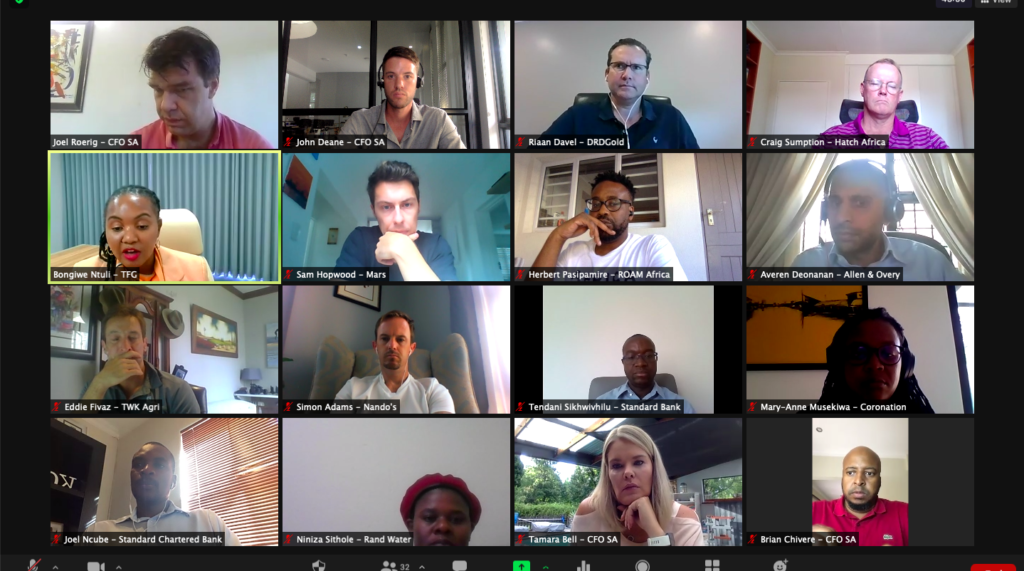TFG CFO Bongiwe Ntuli shared how the company has put their employees first, even during Covid-19.
On Wednesday evening, 27 January, CFO South Africa kick-started 2021 with the first CFO Community Conversation of the year, which focused on how supporting local companies and communities boosts the economy and your business.
The Community Conversations were born in 2020 after the government announced a national lockdown in March, prohibiting CFO South Africa from bringing finance professionals together at events. Because of Covid-19, events remained a risk throughout the year, but CFOs could come together every Wednesday evening and talk about the challenges they were facing during the unprecedented time, as well as the good things that came from it – like more family time.
CFO South Africa MD Joël Roerig welcomed the finance professionals, who had attended many of Community Conversations in 2020. “It’s fantastic to see so many familiar faces,” he said. “For everyone, 2020 was a very strange year, unlike anything we have ever experienced. But we rapidly adapted and this year we have some very exciting plans.”
He then handed over to TFG group CFO Bongiwe Ntuli, who shared the story of how the clothing retail group managed to put its employees at the front of their focus during Covid-19, like it has been doing for many years.
After the hard lockdown was announced in March, retail stores across the country had to close their stores. This meant that companies like TFG weren’t making any money from their stores or online for an indefinite period of time, and yet they still had obligations that needed to be serviced.
Bongiwe and her team reevaluated the strategic imperatives that they wanted to achieve and, along with cash management, at the top of that list was to look after their employees. The group, which employs more than 30,000 store staff worldwide, decided to keep on paying their staff their basic costs throughout the lockdowns.
But putting their employees first is not new for TFG. One of the company’s values is to make a meaningful difference to its people’s lives by providing training, skills and experience, which in turn drives economic growth and development.
“Over the past five years, the group has spent over R1 billion to develop local manufacturing capability together with the South African government and close to R600 million on learnerships, bursaries and education related activities. The number of training interventions have been about 630,000 over the past few years,” Bongiwe said.
The company’s CSI flagship project, SEW Good, brings on board previously unemployed women and upskills and trains them. At TFG’s Prestige factory, these women manufacture the iconic purple blanket, which is donated to disaster-affected communities.
Another one of the retailer’s CSI projects is Mhinga Village in Limpopo, where they run learnerships. At the end of the 12-month program, about 80 percent of the students manage to finish and graduate, and 70 percent of those are put in long term employment within the group.
TFG also offers hundreds of internships a year to bring people up to the right level of skill and experience. These interns are then absorbed into the company’s store environments worldwide.
When the lockdown restrictions were reduced, retail stores were allowed to reopen again and although the borders were open again, there were still significant delays in receiving those goods due to Covid-19 protocols.
However, these delays didn’t effect TFG’s business and it didn’t take long for them to return to normal. This success was owed in large part to the fact that the company has a strategy of purchasing local goods and uplifting local markets.
Inspired by Bongi’s story, Unilever CFO Mikateko Tshetshe thanked Bongiwe and TFG for prioritising local development. “I believe that we all have a role to play in reducing unemployment and building skills development for a flourishing and growing nation.”
The attendees were then separated into breakout rooms, where they go to share their stories of local upliftment.
Hatch Africa kept on paying suppliers during lockdown. “What we’ve also tried is to do more work from our offices in South Africa for our global companies,” said CFO Craig Sumption. “This means we are employing more people here in South Africa to work on global projects. And it makes sense from a cost perspective, because the cost of living is a lot lower in South Africa, which means we’re more competitive in the global environment.”
CFO Riaan Davel said that, while DRDGold focuses on large purchases from South African companies, like Sasol, it continues to address the needs of local communities in other ways, including their various rehabilitation programmes.
Read more: CFO Riaan Davel: An eco-champion for DRDGold
“Some of our challenges are that we have a massive footprint. If we want to utilise companies from local communities, we may struggle to keep up with the volume we require. Because of the volume of material we process, we need a lot of reagents, which is challenging to buy from a small start-up company,” Riaan said.
Mars South Africa CFO Sam Hopwood said that often companies will make financial donations or product donations to NGOs, “which is a great way to support short-term relief efforts”. But he felt inspired by the conversations of education and empowerment of the evening.
“Mars has embarked on an initiative that looks at empowering communities through long term, sustainable initiatives that are connected to the company and brand strategy,” he explained. “Project Qala is a programme designed to empower women food vendors in townships with cooking skills using the Royco brand and helping them grow their businesses by teaching business skills, including quality and food safety.”
However, he said that the challenge is how they can build that scale and impact thousands instead of tens to hundreds of people without having that investment reach.











